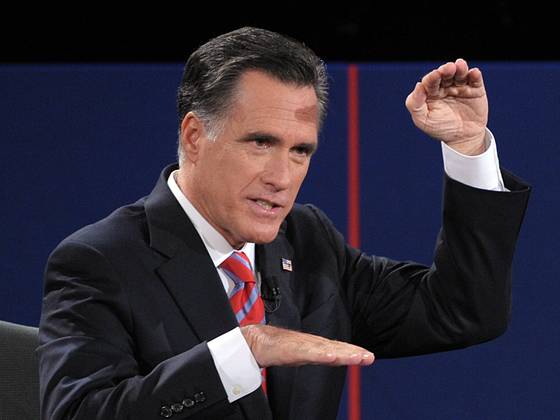Calm reaction in China to U.S. debate

Republican Presidential candidate Mitt Romney speaks about China during the third and final presidential debate at Lynn University in Boca Raton, Florida, October 22.
(Photo: Saul Loeb, AFP/Getty Images)
1:28AM EDT October 23. 2012 - BEIJING –In China, some viewers reacted calmly as they listened to Monday night's U.S. presidential debate.Some said that it presented a negative view of China and dismissed the statements by President Obama and GOP rival Mitt Romney as expected campaign rhetoric.
"No matter who takes office, their policy toward China will be similar to today's, especially in the trade area, because the main theme of the relationship is still cooperation, not confrontation," said Jin Yinsong, a Beijing-based investment adviser for China Jianyin Investment Securities, a large brokerage.
China was the final topic of Monday night's debate, but the timing, about 10:20 a.m. local time, and the lack of full, live coverage on Chinese-language TV channels limited viewers and immediate reaction.
"Chinese officials will be satisfied by the debate, as the China topics were trade and currency, and neither candidate mentioned human rights, so it was quite friendly towards China," said Hu Xingdou, an economist at the Beijing University of Technology, who watched on CNN, available at many hotels but not in private homes.
Given the track record of U.S. presidential candidates, talking tough on China, then acting more moderately once in the White House, the government in Beijing appears to have grown more accustomed to getting bashed in the U.S. election season.
"If Romney wins, he will likely have to change his plan of labeling China a currency manipulator, like previous candidates, or China may react in ways that hurt the U.S. economy too," said Hu, who scored the debate an Obama victory. "The Communist Party has always preferred the Republican Party, as Mao once said, as they focus on free trade, while the Democrats are more likely to raise labor rights, etc."
China should not be labeled a currency manipulator, as "the government has made great efforts on market regulation, and loosens the control day by day," said Jin, the investment adviser.
"I don't think China is a cheater in international trade, it's only an election strategy to contain China," he said. "Made-in-China is not the reason for America's unemployment."
Chinese theft of U.S. intellectual property and counterfeiting of U.S. goods are long-standing problems, mentioned by both candidates.
"But in recent years, China has developed a lot of our own technology. We learned first, then surpassed our opponents," countered Gong Chen, a software engineer at a large local firm in Beijing. "America is the best in software in the world, they also see the progress China has made, so they are afraid of and blame ZTE and Huawei. I don't believe these two companies are spies. They just take a proportion of the U.S. market, and the U.S. is not kind to them because of various complicated reasons," said Gong, who insists China is attaching more importance to intellectual property protection.
On the booming micro-blog service Weibo, Chinese Internet users offered diverse comments. One said that whoever wins will implement sanctions on China, so China must impose countermeasures to achieve greater development, wrote Li Shaochong, an entertainment agent.
Sports anchorman Huang Jianxiang, who live-blogged the debate, was swung by the sound of the candidates. "I like Obama a little more because Romney's voice is a bit dry and shriveled, I feel he was not calm enough," he wrote.
Official reaction is likely to be similar to what was offered after the second debate, which was said to be "a vanity fair for China-bashers competing to flex their muscles on China," said a report last week on state news agency Xinhua, "offering up talking points that have less to do with China than with the continued competitiveness of the world superpower."
U.S. politicians should "embrace China's rise and acknowledge that engaging with China will amplify win-win results, but scapegoating, isolating and vilifying China will hurt both sides," according to the report.
Offering reassurance on Chinese plans, China will not become a "hegemonic power," wrote Chen Xiankui, a professor at Beijing's People's University, in the state-run Global Times newspaper Monday.
Reinforcing comments made by Chinese President Hu Jintao in May, Chen promised China will be "a new kind of great power in the 21st century," one that "doesn't enter into rivalry with other countries, that can create a win-win situation with the West and develop alongside other parts of the world, and that rises peacefully as a developing Asian socialist country with Chinese characteristics
No comments:
Post a Comment
Comments always welcome!